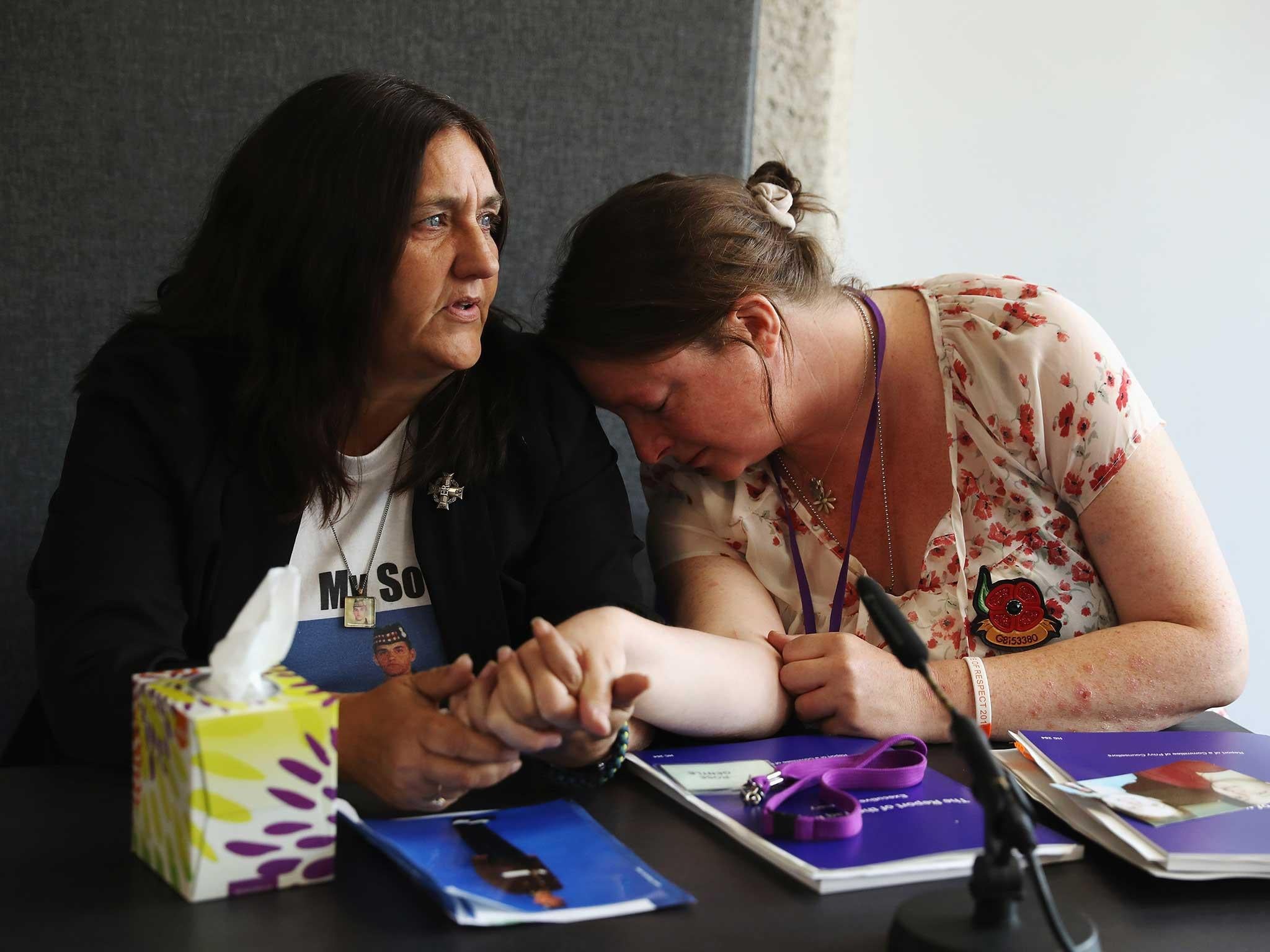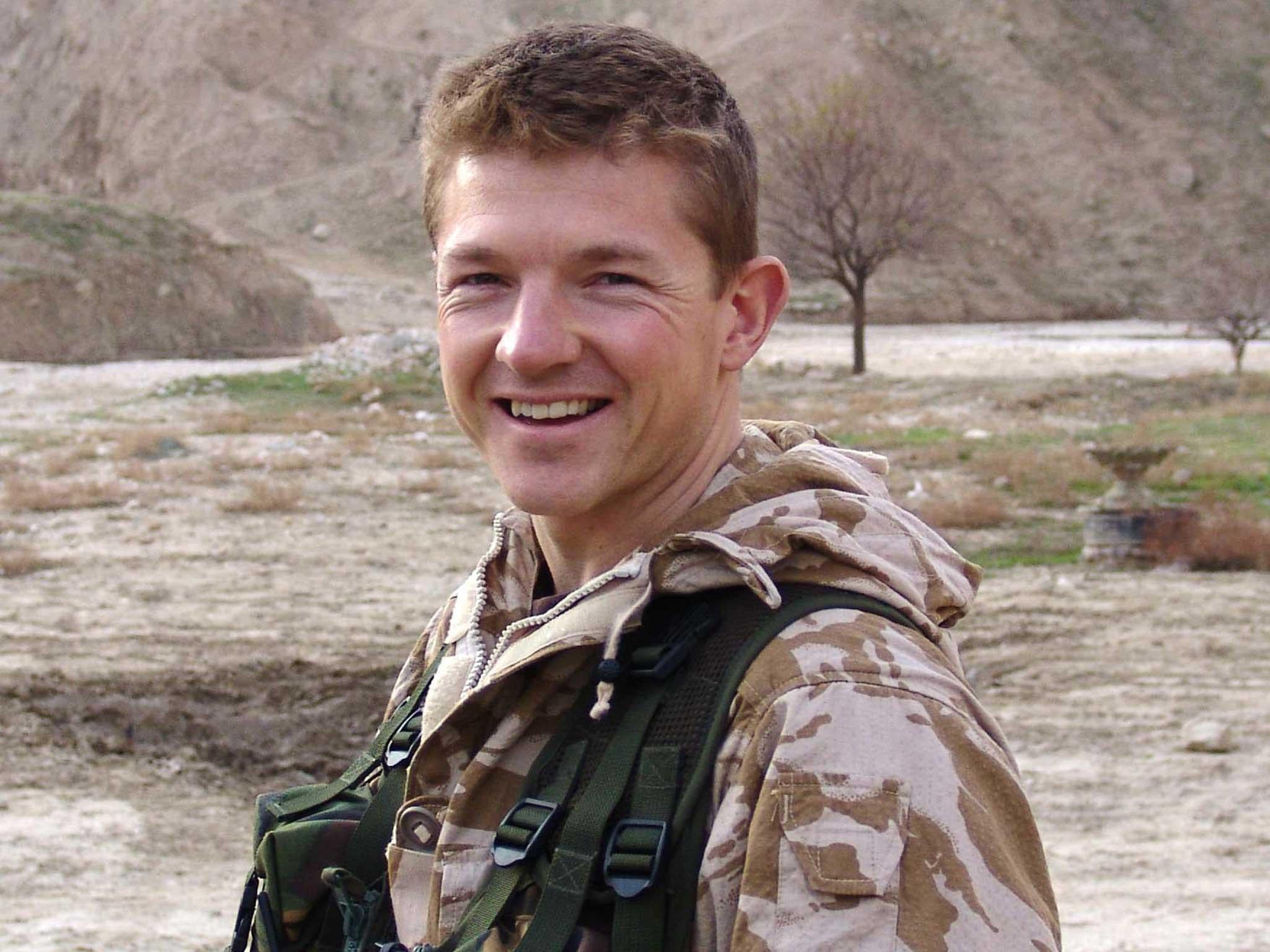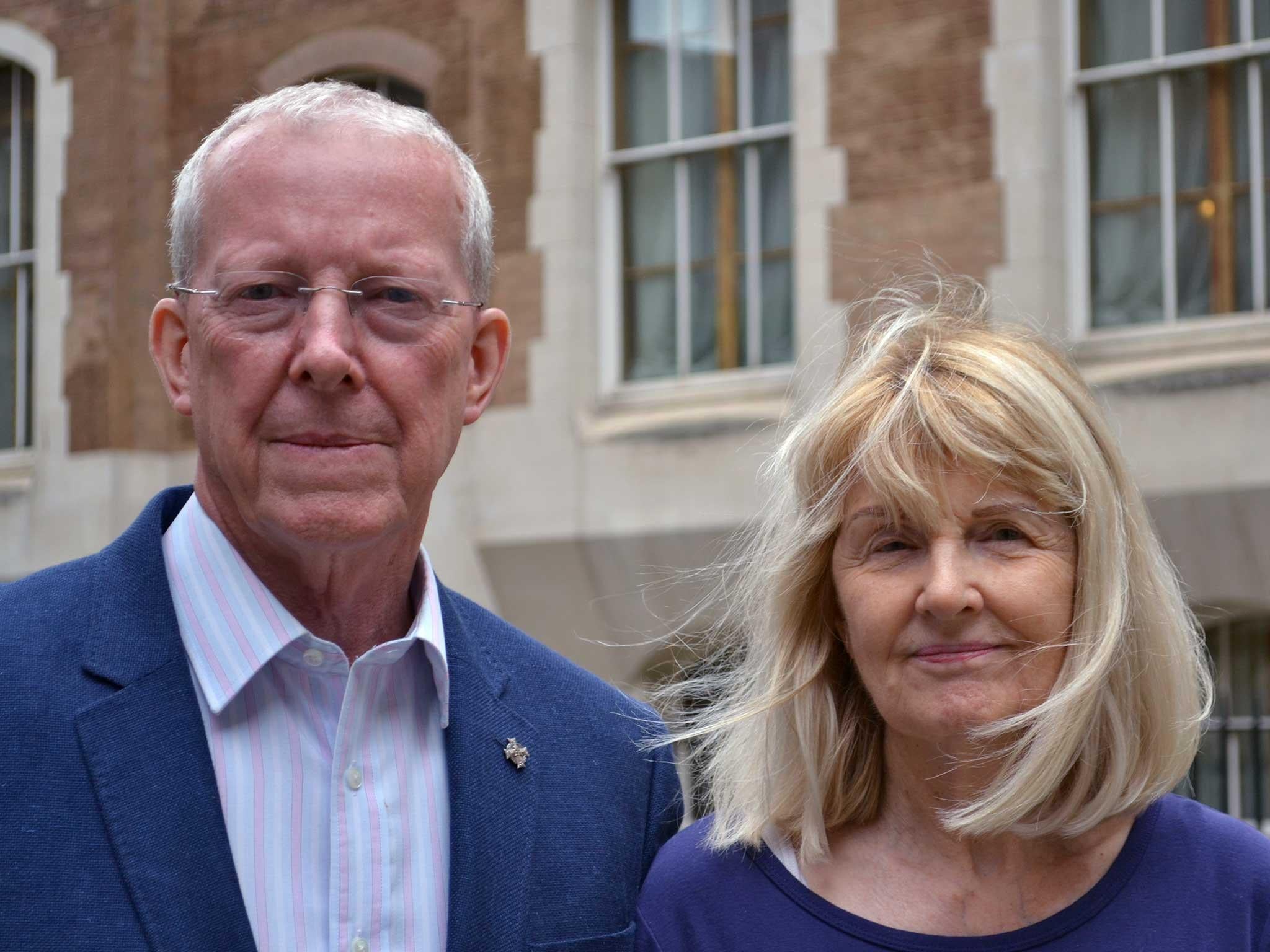Chilcot Report: Bereaved families say Tony Blair is ‘the world's worst terrorist’ and we want to see him in court
Relatives of servicepeople killed in Iraq are looking to use the report as the basis for legal action – with Tony Blair one of their main targets
Tony Blair has been called “the world’s worst terrorist” by one of the families of the 179 British servicepeople killed in Iraq, moments after they heard Sir John Chilcot finally deliver his verdict on the Iraq War.
After Sir John delivered a summary of his findings, Sarah O'Connor, whose brother Sergeant Bob O'Connor died in Iraq in 2005, fought back tears as she said: "There is one terrorist that the world needs to be aware of and his name is Tony Blair, the world's worst terrorist."
She was speaking at a press conference called by some of the bereaved families, who had loudly applauded Sir John as he finished delivering his summary.
The families made clear that they would now be considering legal action in light of the findings of the 2.6-million-word, 12-volume report – and Tony Blair would be one of their main targets.
Ms O'Connor said her overwhelming emotion on reading the report had been anger.
Referring to Mr Blair, she said: "If he is so sure of his decision, why is he not here, looking at our eyes and actually seeing our faces?
"When he gave his evidence it was definitely the Tony Blair show. He thinks he's the puppet master pulling the strings."
She added: "The terrorists took my brother – and in that sentence of terrorists I include Mr Blair – took my brother and took my family. But you won't take me. I'm going nowhere. I'm going nowhere Blair."

One bereaved father, Eddie Hancock, from Wigan, whose 19-year-old son Jamie Hancock was killed in Basra in 2006, said Mr Blair should now be exiled from public life.
He said: “I hope and I would like to call on all politicians in this country that for the grievous damage this man has inflicted on this nation, on its armed forces, that he be banned from any form of public office for life. At the very least."
Mr Hancock added: "Chilcot's report wasn't a whitewash by any means. What he has actually said is that Blair undermined the United Nations. Now, if somebody does that, you would think that the act was illegal. He's also misled Parliament, he's fabricated facts and misrepresented them."
Roger Bacon, whose son Matthew died when his Snatch Land Rover was hit by an IED (Improvised Explosive Device) in Basra in September 2005, told the press conference: “After sufficient time and proper analysis of Chilcot’s report, we reserve the right to call specific parties to answer for their actions in the courts, if such a process is found to be viable.”
Making clear that Mr Blair was now in the frame for possible legal action, Mr Bacon said: “The executive summary does not name names, so I am not in a position to say who [might face legal action] – with the exception, of course, of the former Prime Minister Tony Blair, who of course is mentioned by name, and it is quite clear that there is a lot wanting there.”
Explaining that it was impossible to immediately offer specific detail on what legal action might be taken, Mr Bacon said: “It is impossible at this early stage to sum up the report accurately. We have had 180 minutes – a minute for each death – to digest a seven-year project.”
He thanked Sir John for producing “such a detailed report” , and urged that its lessons were learned, so there was never again a repeat of what Mr Bacon had hours earlier described to The Independent as “a total and utter catastrophe”.
Mr Bacon told the press conference: “We trust all parties will learn their lessons
“Government and democracy must not be trampled over, particularly with such cost to British and foreign lives.”
Rose Gentle, whose son, Gordon Gentle, died while serving in Iraq with the Royal Highland Fusiliers, said the report meant Mr Blair "got his comeuppance today".
Fusilier Gentle, from Pollok in Glasgow, was 19 when an IED exploded under his Land Rover in Basra in June 2004. Mrs Gentle said: "I hope he [Blair] goes to his bed and thinks ‘what the hell have I done?’ because he will never be forgiven.
"He will be remembered not as a prime minister but as a person who sent them on an illegal war. I would love to see him in court."
Melinda Ingram, whose son Chris Dunsmore died in 2007 just days before his 30th birthday, added: "A lot of the families want to take Tony Blair to court."
She said the report confirmed some of the evidence for going to war had been "massaged or presented in such a way that it shouldn't have been".
Mr Dunsmore, an RAF reservist, from Leicester, was just hours away from coming home on leave in 2007 but became the first reservist to be killed in action since the Second World War.
His mother said: "He didn't have to go. He gave up one year of his life to go because he thought it was the right thing to do."
She said the report "isn't justice yet because it's just evidence," before adding, "but it is evidence that might in the future result in some justice".
When Tony Blair was asked, during his own marathon press conference, whether the families of dead soldiers were justified in taking legal action against him, the former Prime Minister insisted: “I stand by the decision I took. [To go to war.]
“I understand not just their grief, I understand their anger and concern.
“But I need people to try and put themselves back in my shoes at that time taking that decision, and understand why I took that decision and why I think it is right, and why I will never, ever accept that those troops who got injured or gave their lives did so in vain.”
He added: “Even as I sympathise profoundly with the sorrow, I can’t accept the implicit nature of the criticism that they died in vain. I don’t believe they did so.”
Later in the press conference, he added: “There is no inconsistency in expressing my sorrow for those that have lost their lives, my regret and my apology for the mistakes, but still saying I believe the decision was right.
“I am sorry again if people find that difficult to reconcile, but I spend so much of my time thinking about this issue, that I would be making a concession I didn’t believe if I said to you ‘I think if we had left him [Saddam Hussein] there, we would be better off.’”
Earlier, the bereaved family members had burst into loud applause after hearing Sir John deliver a summary which included searing criticism of the failure to equip troops in Iraq properly and which stated that in the run-up to the war the alleged threat posed by Iraq was “presented with a certainty that was not justified”.
They also heard Sir John say that "Despite explicit warnings, the consequences of the invasion were underestimated. The planning and preparations for Iraq after Saddam Hussein were wholly inadequate. The Government failed to achieve its stated objectives."
Sir John said the Ministry of Defence had been "slow" to respond to the threat from insurgents' roadside bombs, resulting in delays in the supply of armoured vehicles to protect troops which "should not have been tolerated".
This appeared to echo the comments of Mr Bacon and other bereaved families who had for years criticised the way troops were made to go out on patrol in inadequately armoured Snatch Land Rovers which they took to calling "mobile coffins".

Mr Bacon had told The Independent that Mr Blair had to take some responsibility for this because he had delayed military planning and equipment procurement for the war “because he didn’t want it to be seen that he was pre-empting any UN resolution. He was manipulating the system”.
The result, said Mr Bacon, was that his son died in a Snatch Land Rover with inadequate detection systems to protect against IEDs that could go through the insufficiently armoured vehicle “like a knife through butter.”
Mr Bacon said: “There were 27 incidents in which a serviceman got killed by an IED while travelling in a Snatch Land Rover. The first incident had been in 2004. With Snatch Land Rovers it was like Russian roulette.
“If the IED had been laid on that patrol’s route, and if the insurgents had people in place to set it off, then that vehicle was going to get hit.”

Mr Bacon, a retired police officer, added that there had to be “consequences” for leaders who sent soldiers to war unnecessarily.
“Because the consequences for the people they send is that some of them die doing the job they were told to do.”
Speaking ahead of the Chilcot report's publication, Mr Bacon had told The Independent it had to be "a basis for some kind of [legal] action, to ensure this never happens again. If not, I would say there is something terribly wrong with the political process.”
He had added: “Most soldiers would assume that if their senior officers told them, ‘you are going to be doing this’, it would be the right thing to do – that the whole campaign was the right thing to do, because the Government wouldn’t do it otherwise.”
Which meant, Mr Bacon said, “From our point of view, Matthew was betrayed. Because the full facts weren’t there. Blair was the one who persuaded Parliament.
“We were misled into believing that there were weapons of mass destruction and that the intelligence showed we needed to do something about it.”
Join our commenting forum
Join thought-provoking conversations, follow other Independent readers and see their replies
Comments
Bookmark popover
Removed from bookmarks